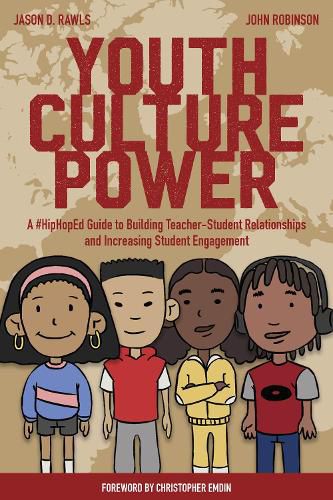Readings Newsletter
Become a Readings Member to make your shopping experience even easier.
Sign in or sign up for free!
You’re not far away from qualifying for FREE standard shipping within Australia
You’ve qualified for FREE standard shipping within Australia
The cart is loading…






This title is printed to order. This book may have been self-published. If so, we cannot guarantee the quality of the content. In the main most books will have gone through the editing process however some may not. We therefore suggest that you be aware of this before ordering this book. If in doubt check either the author or publisher’s details as we are unable to accept any returns unless they are faulty. Please contact us if you have any questions.
In our schools, hip-hop culture is the dominant culture among the students. In Youth Culture Power: A #HipHopEd Guide to Building Teacher-Student Relationships and Increasing Student Engagement, Jason D. Rawls and John Robinson, educators and hip-hop artists with experience in the urban classrooms, focus their efforts through Hip-Hop Based Education (HHBE). They argue that hip-hop culture could be useful in building relationships and building student engagement.
The approach to achieve this is Youth Culture Pedagogy (YCP). YCP is based in a foundation of reality pedagogy (Emdin, 2014), culturally responsive pedagogy (Ladson-Billings, 1995), and HHBE (Hill, 2009; Petchauer, 2009). In this volume, the authors lay the groundwork for YCP and how they envision its use within the classroom.
In Youth Culture Power, the authors put forth their C.A.R.E. Model of youth pedagogy to help teachers create a positive learning environment by building relationships and lessons around students’ own culture. Instead of forcing students to give up the things they frequent, Rawls and Robinson feel teachers should discuss them and when possible, use them in lessons. The purpose of this book is to present a fresh take on why educators should not discount the culture of youth within the classroom.
$9.00 standard shipping within Australia
FREE standard shipping within Australia for orders over $100.00
Express & International shipping calculated at checkout
This title is printed to order. This book may have been self-published. If so, we cannot guarantee the quality of the content. In the main most books will have gone through the editing process however some may not. We therefore suggest that you be aware of this before ordering this book. If in doubt check either the author or publisher’s details as we are unable to accept any returns unless they are faulty. Please contact us if you have any questions.
In our schools, hip-hop culture is the dominant culture among the students. In Youth Culture Power: A #HipHopEd Guide to Building Teacher-Student Relationships and Increasing Student Engagement, Jason D. Rawls and John Robinson, educators and hip-hop artists with experience in the urban classrooms, focus their efforts through Hip-Hop Based Education (HHBE). They argue that hip-hop culture could be useful in building relationships and building student engagement.
The approach to achieve this is Youth Culture Pedagogy (YCP). YCP is based in a foundation of reality pedagogy (Emdin, 2014), culturally responsive pedagogy (Ladson-Billings, 1995), and HHBE (Hill, 2009; Petchauer, 2009). In this volume, the authors lay the groundwork for YCP and how they envision its use within the classroom.
In Youth Culture Power, the authors put forth their C.A.R.E. Model of youth pedagogy to help teachers create a positive learning environment by building relationships and lessons around students’ own culture. Instead of forcing students to give up the things they frequent, Rawls and Robinson feel teachers should discuss them and when possible, use them in lessons. The purpose of this book is to present a fresh take on why educators should not discount the culture of youth within the classroom.